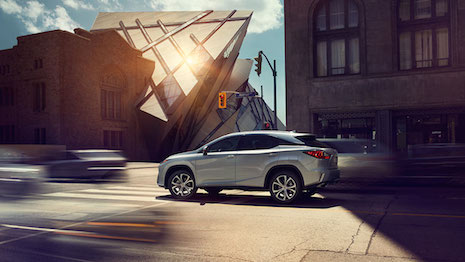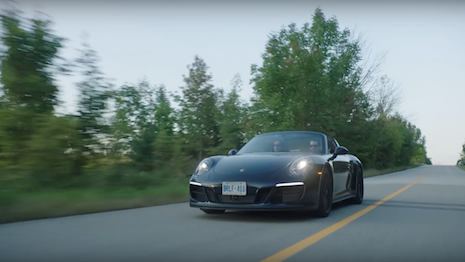Although automakers have found success with more sophisticated infotainment platforms, drivers report disappointment in areas such as engine problems and driver assistance systems.
According to the J.D. Power 2019 Initial Quality Study, new vehicle quality remained steady and failed to improve on the previous year for the first time in five years. As automakers continue to push vehicle automation, they should take note of issues with automated assistance systems.
J.D. Power's study reviews the number of problems experienced within the first 90 days of ownership.
Slowing down
As in 2018, the industry average for new vehicle quality is 93 PP100, or problems experienced per 100 vehicles, with lower scores indicating higher quality. Only 13 brands saw improvements, while 18 declined.
With a score of 58 PP100, the Porsche 911 was the highest rated model for the second straight year. However, Porsche as whole did worse than the industry average with a score of 96 PP100.
Other standout luxury models include the BMW 2 Series, BMW X4, Mercedes-Benz CLS and Lexus RX.

The Lexus RX was named highest initial quality midsize premium SUV. Image credit: Lexus
Korean and U.S. automakers performed best in initial quality, with Lincoln ranking as the highest quality premium brand with a score of 84 PP100.
In addition to Porsche, European marques Mercedes-Benz, BMW, Audi, Land Rover and Jaguar all fared worse than the industry average. European brands have fallen behind with their infotainment offerings.
Overall, new vehicle owners have seen improvements in infotainment systems, reporting less problems with Bluetooth and voice recognition.
Advanced driver assistance systems have caused more headaches for drivers as they become more mainstream.
While in 2018 drivers of premium cars experienced 5.0 PP100 with driver assistance systems, that figure increased to 6.1 PP100 this year. Mass-market vehicles average 3.5 PP100 issues with similar systems.
Drivers also report issues with "check engine" lights, engines not starting and brake and suspension noises. Other superficial issues include discrepancies in vehicles' body paint.
Automated accessibility?
As luxury automakers continue investing in automated vehicles, improvements will need to be made to ensure drivers adopt the technology.
German automaker BMW is linking with an IT partner as it aims to push forward in its creation of autonomous vehicles.
BMW has tapped DXC Technology to power its High Performance D3 platform, which gathers test data from self-driving road travel. DXC’s technology is aimed at speeding the engineering and testing processes for autonomous vehicles (see story).
German automaker Volkswagen Group is investing in automation and electrification with the launch of a new unit dedicated to improving vehicle software and services.
Moving forward, Volkswagen Group – which sells luxury vehicles under marques including Audi, Bentley, Bugatti, Lamborghini and Porsche – will be uniting numerous groups and digital ecosystems under the Volkswagen Automotive Cloud. As demand for automated or electrified vehicles builds, Volkswagen intends to standardize software and technology to better serve drivers (see story).
{"ct":"IyBvsQ\/D6PL8u+kYH8pYBD4ne+wAK6espRgfTLHKQpqmlLozqIFSJqx91TfinyZo\/\/H7+VNIXAdL5RggJHXHO9MfqVIAVrJ+CVYCo529hRJZTVRnUs0YTA3YjcvYS9SflH+vDeVeLuaw4s9IwGhOd2MZEhK8WEoQXo5Tc2vtNGj0n+hEeJFa8FoRkX36zi\/EtLYiHNo460cgI09QnUgDWT19oYaql\/FtVHPiPlWMaH\/yyjyvw3DPhLJa3qbg8wYfo5yTblyLVeokuPeadXT9v26w9ccHGF7Xi\/\/ceEiVygigBU4oj3zVqY+4vjgwsVEqijbOGCIW8lFvJDg2AAlB8dP8Cq+INcJ4zHQTfJYp8g0DNxs2\/7LzaynlITscxtOtcC3aWnta\/yj\/oBEIKgoOyBmed4AUlINtuI1VfRlODZe+n0PtFPYQfXwY38xWCBpVpWLTM07DFIMBz61cXMJWkS+xQz3j1671GUxiAea7FwTf4L8nN\/txD6eOVPFmxQs6rk2cmhpNSrOXmzIGfD85GfNTtJewkNwg0CtkRG4tIDXZqmFbH4yLSCqWMEEXuXpEnyzNT\/2lvgR5ri\/PuKIf0j6yC25TdnBGDBFNHxcxJZ5n8RMoSeI4otGXiJloJAmMe\/5yKTLH7XsNB63MM1nTkknxv9ffJcgPcnfQdX+wjen3VOOtzB+1uFmoKBvFKEpt6ynmYBcncztNsKmEWlDACfBEmHsionGNxzMze6ZVf6OKWf12AclBPBVVjHpgxniyBKBLNRx1KFevr1YQCKG4\/E37AXes3a1jFqLXlN6o2dxx\/ut6uxm5JlLRwz3qdYPj6nOp\/IUIUy4aW2CRHI1d6PfnLa8anOVuwltSfja37oTFElt0813xVglxvu7VdshUIfgiA+vWwAL0KBiFv5UEAAqR4DCLzEpx7wIva4vt\/bY5k1PNkkZuUxGh9EhXiJpMEGi0RGcikCPDk2A8kD1wiGL6akU4E82bOYk6lYofEhR30gQB90\/FEaBqgZEcbSdDPebbT3Un6Zcz7PeXM5ZX+N7f6Sfqg3oPN6E81HJDuoG8lzmu97cflPDARNxWLklNBSUA1mSzpIBfSFRYh+1qSm9TclZwwIIaF1oXk4kdgJH7q74rimaINLpewT93+z3nVhaKX3xDqiUug3vC6wyZWmCeUfmRIBKc\/m\/RMRAFvTtWbJzgJSZ624CZ5S5GUFI4+cqXTX5fnWP07CCoGVB\/387KZf79Ncmy\/1dyW63KZ2vVN4l7vdGQcGUDkSW65JwYPY4WndFdeSWFhdEgWS4xDYVSAq9XZWfsvHXG+wn+bAnW4vEz1XAtjZ9kajJ1ltW15lD3AIjnBY\/ApMKY+sM\/xzJoVdjtiaUhG9hZjr9rdWzd7wN8ia8U78I4sXokYoqs8mYosVZWTRVN8\/sbwPn8IE+ptyg2P4emTsnU7laRDVI5Xq9Swgi1ksUsXDq7FQ2yimnXQXnVzEZL9K\/zDGD+RwUNNxM6flvmRM6Y4FvjrVu6HEI9Svkw49d558kn29TvKhyQGEdMoWAUE5HD4680kAm\/ROisQI1K53iETkYsRHc+ErwRl3bY7\/vbKUjwCUYz935h\/RZ15LTajzVCo3D2csamHvFS\/0mApvZ+win3\/pByjEVI6GMyJW+QJ3c6IFzoBZfl0QTfo4tJ3+bYoBvHNbf5LE0Vgqn8zyZwqPuN\/2hb2Gqhf3uva641SofxKixIoxO6\/jSRImNl72xzc6MhV7ZchejuEjgEGRz8mWju3sGW6vguMcub5jsOx7FdgI7+NbqRLR\/5nKIlFD43OmXnRcu8XpwdROQ8II6uOn1+wjFqnRm8wUhSE3Fjf2LK3JhiUFYn2jTGJJ\/gIq7tAV6M4t58k7fl8kHYWZAbH+hDqjAgg2B9Gmut89PU0HQct24KgCv+1eYsNStYExVCPZ5y11MvFE6ADZ6jqKl3v3AdVYiHlqUFVJoRL+yraZEgw2Hv1yRXLain7+uU9jmPq9kzU7KQATamZngQj5eprM+2NvX32RymAuEaUIfpNr\/+FqWAtHRb1cf+AmHhxrjQFSJJa\/uQPvoWfzxfK62XwikvzkFC5+QI32dMNCcnRkKRy5J5tqfWJpQ8UWUZZS9OFpOP5mzbu8BuFvX\/HVATG28dR6tQUnHwMcZwj2bQmO6FBmYbueiLQQhhQxEmDMtpzltpmO8IlcuvYbN2TSES8hTw2cARWsDmiMrwZ646lKSy56AafAw4Rwehtxkw0twkwylmuoGRarbZ5RVVcTlT94vR+QKJhxgMcTMcKLqk2tb+0tWiyIvf92bklj24P8zJ\/PRfc9+co6B2bvV+RNELyZ0cWJGCQ0tTAtUEZodBvEqcq8Q1P51XCMGXcTSIKGOdVQ+SV+cOKFwgpIBfVg79cUkXonPk9K6pNmN4N3zES4quH7Ja307uG4BWm41+LlTrSzBekK0Yk110plDibjeDHnUE+aaSap+LnGCosUHMRopJVRu7N\/Yb2lciDKfECmf8CNXpH56W+MW6pBnFKwNEkRB2eN7UghpPs9BrmVtWiV7rTtIWBQFTmQJTvF1\/jKz1FaYakuWds+ssZFZMZ\/oich6weZGHvF\/uIiw1t+bw+Bh3jBOD6fn6xxMSBXsjWXpkysQzg+gGtL7OtqpEGbOLFGWbUv2qmBtEpUQHSVsWSerKj5y4z2JmbgHjLST+eUH2EGggVTyHqn8h5g7pnItwuCaUo5EC7xW7slGIOG8ynYIMkIZ8ugOFXfdiSDwyoUXQkFL2Kk\/uaP63TpJOyUL0174Mya1ibsa\/rPeJYB9Vj6YJ5xuR+09XXrwWzhfvz0yyTF8NE9oatzn0RaWb2RZbsY72mokwVxa\/3+QcNpl+8wa8+C15w2Ky5EEgjmn5S7xRolpUwYs1zOGs0epZJ3OaugV5vckbisWb\/AurDuf3GjJOlcq2PI0OwT63lnsxsukN5wvaX9nlb86LmWLesksAZ\/JySnUVOntlaV+nH++VhIloh529uJ9F5RSa+Q+wSgIf5j+ynT3B5tOcXwhMDndLxLvF6e8EnWCZNCadJI0MzzCYeEsNU7+uun4LSRDRLQ9yylj7sDH8vpuAYBSxC0Dx629e7lMtE5aJadSL8lSCAad7wC12Z0FQtPoxsU02bsQKIbad\/pNQXEWlHSRSgx1MTksJ1zYoqbGAC0t6OlhPkvSaSd66FHWx1q83hCIopQIfVBe6nOvSaqRgkLppje+hKyDSXyi7mkjo7IWWtl6ZjqjU6lywDWLSeigXN7d0FDHyUhnUm1lgUVqjvCBV7KkZouzE9+bNAfOIkY4Ji0xgy7EYsOx7IIIUURBuceIsDzCAK8\/jUWSXomTwZWGy++Dg7uDGCA9qHr33+bFBwEn91la+Gk8yJjDPr1KGfe8j\/n0PXh\/lgpeK5crNcr56eRg7zREne4aD0zj\/eN7FmsNxRu2goD3TyKZtAltkc7vhR\/ciV5ZiDz9zVOh6KGnA6R0aH+lMbISPZFbLbxcLkByRlDNZbICQXYcKMKpvzH3Hh06X07Y58si50RtfDqP1nc5uaH6og9\/FeFYuNoePiMcG3xjLoiY34VLjb9g15hIfPXqs8coNywgk4t33FgQvov8cC+CXdB6w8ZKdMGCoUse\/00W4Gbtr4buDnvaDQ9qYs89++HX4Ov9RvJvppD2aUSILtRPFfYdrhnGqomP7yo2hsYkDHGDHdOSWgpVeZOl7TjmagkH4qRWPRnC9d4eTEHlGzBxHpsPQQ0kX2\/Igt7srOxeKAAB0Mc2KBRsa3DJBTaG29oBEWfRRgLZWVRk7SqUD\/0z5zdu30JK\/OLA8oUEgbJ1oUNrGY30Itc1Lm5oNrOyZU9K938xf68JsTTbvONCi7i6DTBj10T6Hzulg6+YycVqN8cd9rd\/msyjpMgks6FxWrciJuMeBbLbi+HdK0slXD5fjUZqnM+VdbooxJeXM+UXAVYJ186aUSIcgS+4jrQ454YIiagWjmBBqpbVSAtPtSqdFpqRz+5sH9\/NBC5qYNFKw6wtMd6H4UPLRo5t\/9F9udO3DvNPAtgROTsgh0H\/LDyF4fNL38P\/zLZvb5Rb3GdpxsAlH8B1qXz1fgkbOEvbIF25+emJls36fA5n68tOPrQcwvvL8xCB3kW8LHYa5WGuiR1AL8p64aAhkT8HOTOrXqfVFpSqehleRbLMaUEreTo9Ve20xJPiqgL7CrTT5qIGpK2HhTj5iuZjV1tdwYnokUYyx9C87gUH9FA89iD5uGqC9gA59D19Rg7zzN800Gu5qBGieE\/e1M+ACTpouQwxntF2jZc83ZujaxQS8Xsl6v19f1eo2p\/0CQ8UTDkXqKyJhHn7MW9Vjj9bzYvzvde90IFXDRrBcBln6jo5eoT2v\/RKmkuSfkVmU+o4Bb7ceiBzko8kws6mQIdC9aLZWO7G02dYOy4CbE4imeDCsAIGT9XCEdo9ZCB8\/9UcyUFqkXuYwlSKm6rEnrVz0CP7z+SjIS4lm85NojhVD7zwa\/OZRdD51TO95AK3ndcjOdDKDy1P4G0FZrHD7ZbW0KeEaJAexDvEfTwNiiA71at2Rh3s4Qqnee1Eaq1jUdZ0JSzYOX6EuzRSuSJeNFo76Es+rlYSSx0\/riMwTkPOLkF+oFzzJ2XYErwRZmZosZddd\/gGhuwBuQQKKWRzfHvg6OjPIU1ZD8vEnPYBIGWeowE\/wmK+TU5JW0XShlkFpuF0R19G\/Wdq0A4QbhOG5H2beFNyvURGS0pkO494wnFkXCf2eEPS5cKQl6+R++Js4\/tZW\/0IjAzprnmsIb+gVXleq6Etv7u76YfI+yutBTs9RrKhkj9\/JjzXaVn95zK7DlLxZ7SXkcWaKYv7XuOL9WrBWCyHGfECtOzIXuOUjuCBn2CUuJxgv2nCIh\/Z6+fq0SBfJsR71W1Uq15wALIsW050sYD+U0yhwoskrEmX4lBxUBtFUmwzWh6LO2p8N5MqiztEZCHeg3PnDRVNWgfFdyoo8JX3JTB1nqGXFL6dWmsKXi02RnbV04wBZLy7VpKxv6nHAI0gcQOZINbJyJOn9QjWig+i+jpdpI2eQqL8iLuhD1GDZhvscNkmU\/RU97mTJeZhXQHC8\/QCQUnlEtqRu3FzR6aLIXhj8WRhC4aijuHPwkiMnHbyb9Mf6vBSxYFl75t6b\/IAedDzmSVOGBr\/jMr73obC13NTRdrnq5sC79ZWhyQhdb3cFNhd7dI1lN0KRNzWc7OY9Wk+DgfSAoo2N5rve2FicUwFZXtMx\/g\/smuLVkKxv\/Cp2xmfazYSSCpuJm8Dg2M9yJlIapfqo5VmoRooe9p3pr7uj1HiWMjnimo9kbWwkPsheQi683z6BBjhstbwjD7a3yRZu\/jcJqzbn9Ce7du1Gd+CR0xvkKxUEfVSQl9k2YWs90B9anvx21Oc1q89dtmDobWi3Z0\/VRA+pRC3Fg+LpmAyKBAw9tfUkT2updZiFTtkg98Q7JkA=","iv":"8f69535edf977c0daf73e23d9970cdb0","s":"973ff7d1f757530a"}

 The Porsche 911 was the highest-scoring model for the second consecutive year. Image credit: Porsche
The Porsche 911 was the highest-scoring model for the second consecutive year. Image credit: Porsche